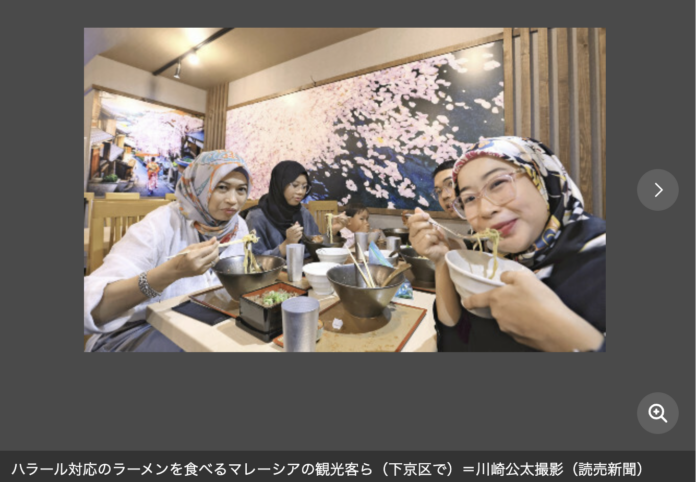A building that opened this year in Shijo-Kawaramachi, Kyoto, has become popular with Muslims visiting the area as tourists. The entire four-story building is a restaurant specializing in halal food, helping Muslims who have trouble finding food in Japan.
The name of the restaurant is HONORUGURANDE KYOTO. The shop has gained a reputation on social media for its Halal-friendly menu of popular Japanese dishes such as ramen, beef sukiyaki and beef cutlets, as well as for its prayer room.
An lunchtime, families visiting from South East Asia and elsewhere can be seen taking photos and chatting in front of the food. Hashim Mohamed Fitri, 58, a family visitor from Singapore, said: “‘I was happy to be able to eat wagyu beef. I wish there were more restaurants where Muslims could go without reservations.”‘
Halal means permissible in Arabic. No pork or alcohol may be used in cooking, and poultry and beef must also be treated in accordance with the precepts. Many Japanese foods are forbidden, as soy sauce and mirin, which contain alcohol, cannot be used.
It is operated by Asset Frontier, which is involved in Halal-compliant restaurants. The ramen broth uses ingredients familiar to Japanese, such as kelp, shiitake mushrooms and bonito flakes, while soy sauce, mirin-like seasonings and beef are brought from Japan and overseas, all of which are halal-certified.
Some ramen noodles cost more than 4,000 yen per bowl, but are highly popular. the company’s representative says: “‘I hope that the presence of this building will make Japanese people feel welcome to Muslims.”
According to the Japan National Tourism Organization or JNTO, the number of tourists from Indonesia and other countries with a large Muslim population exceeded one million last year, a record high. The Kyoto Tourist Association estimates that a total of 330,000 tourists from South East Asia and the Mid-East used approximately 110 accommodation facilities in the city from January to July.
Compared to the rapidly increasing number of Muslim tourists, few restaurants are able to offer Halal food. According to the Kyoto Halal Council, only about 20 restaurants in Kyoto have obtained the council’s Halal certification, and many closed after the pandemic.
In addition to the cost of procuring ingredients, it is necessary to separate the cooking process from other dishes in the limited space, and the association says that it isn’t easy to handle Halal food as a business. First of all, it is necessary to expand efforts to ensure that Muslims can eat with peace of mind, for example by displaying information on what is contained in the ingredients.



